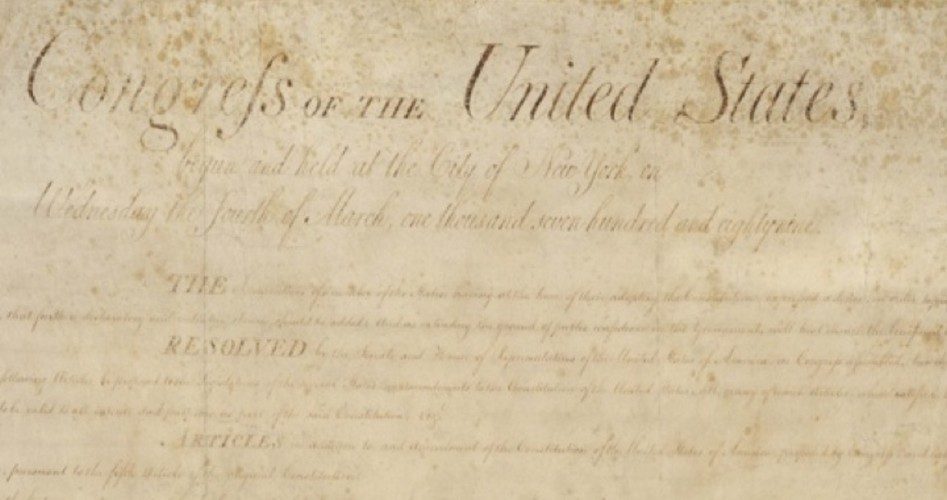
The U.S. Bill of Rights is nothing more than a list of powers denied to the U.S federal government by the American people. And by the provisions of the “due process” and “equal protection” provisions of the 14th amendment to the U.S. Constitution, these prohibitions apply to states and local governments as well. The 14th amendment says, in part: “No state shall make or enforce any law which shall abridge the privileges or immunities of citizens of the United States.”
Nevertheless, every part of the prohibitions listed in the U.S. Bill of Rights has been violated by the federal or state governments at one time or another in American history. Below is the text of each prohibition listed in the Bill of Rights, followed by one or more links to present or historical violations.
British Parliamentarian William Pitt the Younger said in a November 18, 1783 speech in the House of Commons:
Was it not necessity that which had always been the plea of every illegal exertion of power or exercise of oppression? Was not necessity the pretense of every usurpation? Necessity was the plea for every infringement of human freedom. It was the argument of tyrants; it was the creed of slaves.
The violations listed below — while by no means an exhaustive list — are an indication that the Bill of Rights has been under occasional attack using the guise of “necessity” throughout American history, especially during the nation’s times of war and national crisis. And the links also demonstrate that despite the unquestioned American military supremacy over any combination of foreign nations today, the Bill of Rights faces more threat today under manufactured “necessity” than ever before.
Amendment I
“Congress shall make no law respecting an establishment of religion, or prohibiting the free exercise thereof;”
1838: Missouri Mormon Extermination Order
1844: Philadelphia Bible Riots
2006: Massachusetts Catholics Charities and Adoption
2013: ObamaCare birth control mandate
“or abridging the freedom of speech,”
“or of the press;”
1798: Cooper/Callender/Lyon prosecutions
1919: Charles Schenck
2013: Surveillance of journalists
“or the right of the people peaceably to assemble,”
1866: Civil Rights marchers New Orleans
1965: Civil rights marchers Selma
2011: Disbursement of Occupy Protesters
“and to petition the Government for a redress of grievances.”
Amendment II
“A well regulated Militia, being necessary to the security of a free State, the right of the people to keep and bear Arms, shall not be infringed.”
2005: Gun confiscation Hurricane Katrina
2014: California laws
Amendment III
“No Soldier shall, in time of peace be quartered in any house, without the consent of the Owner, nor in time of war, but in a manner to be prescribed by law.”
1941-45: Aleutian Islands during WWII
Amendment IV
“The right of the people to be secure in their persons, houses, papers, and effects, against unreasonable searches and seizures, shall not be violated, and no Warrants shall issue, but upon probable cause, supported by Oath or affirmation, and particularly describing the place to be searched, and the persons or things to be seized.”
2004-Present: FBI National Security Letters
Amendment V
“No person shall be held to answer for a capital, or otherwise infamous crime, unless on a presentment or indictment of a Grand Jury, except in cases arising in the land or naval forces, or in the Militia, when in actual service in time of War or public danger;”
“nor shall any person be subject for the same offence to be twice put in jeopardy of life or limb;”
“nor shall be compelled in any criminal case to be a witness against himself,”
“nor be deprived of life, liberty, or property, without due process of law;”
1814: Andrew Jackson suspends Habeas Corpus
1861-65: Lincoln suspends Habeas Corpus
1945-47: Habeas Corpus suspended in Eisentranger case
2002-04: Murat Kurnaz denied Habeas Corpus
“nor shall private property be taken for public use, without just compensation.”
Amendment VI
“In all criminal prosecutions, the accused shall enjoy the right to a speedy and public trial, by an impartial jury of the State and district wherein the crime shall have been committed, which district shall have been previously ascertained by law,”
2006: Military Commissions Act
“and to be informed of the nature and cause of the accusation; to be confronted with the witnesses against him; to have compulsory process for obtaining witnesses in his favor,”
“and to have the Assistance of Counsel for his defense.”
Amendment VII
“In Suits at common law, where the value in controversy shall exceed twenty dollars, the right of trial by jury shall be preserved, and no fact tried by a jury, shall be otherwise re-examined in any Court of the United States, than according to the rules of the common law.”
2013: Chevron v. Donziger
Amendment VIII
“Excessive bail shall not be required,”
“nor excessive fines imposed,”
“nor cruel and unusual punishments inflicted.”
Amendment IX
“The enumeration in the Constitution, of certain rights, shall not be construed to deny or disparage others retained by the people.”
2010-present: Right to anonymous political speech
2014: Freedom not to associate
2014: Right to know government actions
2014: Freedom from identity cards
Amendment X
“The powers not delegated to the United States by the Constitution, nor prohibited by it to the States, are reserved to the States respectively, or to the people.”



